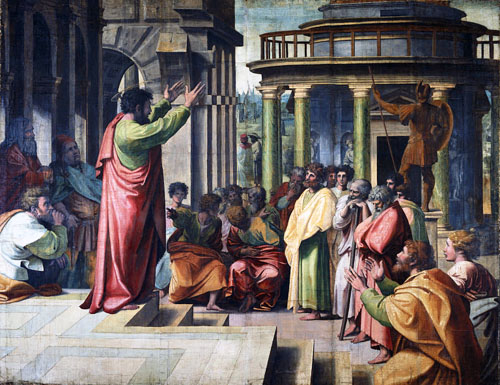For God so loved the world that He gave His only begotten Son, that whoever believes in Him should not perish but have everlasting life. (John 3:16)
John 3:16 is one of the most well-known verses of the New Testament. It is regularly used in evangelism and is one of the first verses new Christians are encouraged to memorize. And who can forget “Rainbow Man,” with his multi-colored hair, holding a “John 3:16” sign at televised sporting events. Or Tim Tebow with the Scripture reference painted in his eye blacking.
Usually people hear or read John 3:16 outside of its context, as though it was somehow plucked out of thin air or wafted down on a cloud one day. But it is actually part of an encounter between Jesus and Nicodemus one night. And it comes toward the end of the discussion, as a climax to the conversation. It can certainly stand on its own, at a certain level, and many people have come to the Lord through it. It is wonderful news, even all by itself.
However, there is an even richer meaning that Nicodemus would have gotten from John 3;16. To understand it in the fuller sense in which it was originally intended, we need to go back to the beginning of Jesus’ conversation with Nicodemus. Because the whole thing, from beginning to end, is all of one piece. So let’s take a brief look.
Nicodemus came to Jesus one night and said, “Rabbi, we know that You are a teacher come from God; for no one can do these signs that You do unless God is with him” (v. 2).
Jesus responded in a way that did not address Nicodemus’ words but instead one that answered his need: “Most assuredly, I say to you, unless one is born again, he cannot see the kingdom of God” (v. 3).
Nicodemus was confused by this, but Jesus said it again, in a bit broader fashion. “Most assuredly, I say to you, unless one is born of water and the Spirit, he cannot enter the kingdom of God” (v. 5).
Clearly, the theme of these statements is the kingdom of God. “Born again” is what people usually focus on in this part of the conversation. However, being “born again” is not the
end toward which Jesus was directing Nicodemus. It is a necessary
means to that end. The new birth is necessary in order to “see” and “enter” the kingdom of God. The kingdom of God is the main concern, and it is through the new birth that one becomes a part of it.
The concept of the kingdom of God was not something new Jesus originated. It was the long held Jewish expectation that arose from the promises and prophecies God gave in the Old Testament. It was about the age to come, the messianic age, when God’s Son, the “Messiah” (which means “Anointed”), would be king over Israel and all the nations.
Psalm 2 portrays this promised reality. In Psalm 2:2, we read about the LORD’s Anointed, who turns out to be God’s Son (v. 7), and the one whom God would set as King over Israel (v. 6). To Him are given all the nations (v. 8) and they are called to submit to Him and serve Him with reverence and rejoicing (vv.10-12).
Now that kingdom had come into the world. It is what the preaching of Jesus was all about. Mark tells us, “Jesus came to Galilee, preaching the gospel of the kingdom of God, and saying, ‘The time is fulfilled, and the kingdom of God is at hand. Repent, and believe in the gospel’” (Mark 1:14-15). His teaching was all about the kingdom and His miracles demonstrated the world-changing reality of the kingdom that was now at hand. As we can see from John 2:2, Nicodemus was not unfamiliar with the teaching and miracles of Jesus, and would no doubt have recognized that it was somehow concerned with the God’s promised kingdom.
Moving forward in John 3, we find that Jesus refers to Himself also as the “Son of Man.”
No one has ascended to heaven but He who came down from heaven, that is, the Son of Man who is in heaven. And as Moses lifted up the serpent in the wilderness, even so must the Son of Man be lifted up, that whoever believes in Him should not perish but have eternal life. (John 3:13-15)
“Son of Man” is another title that has messianic and kingdom significance in the Old Testament. We find it, or example, in the book of Daniel, in a messianic passage about one who would come from heaven and whose reign would fill the earth:
I was watching in the night visions, and behold, One like the Son of Man, coming with the clouds of heaven! He came to the Ancient of Days, and they brought Him near before Him. Then to Him was given dominion and glory and a kingdom, that all peoples, nations, and languages should serve Him. His dominion is an everlasting dominion, which shall not pass away, and His kingdom the one which shall not be destroyed. (Daniel 7:13-14)
In view of the messianic kingdom theme that begins in verse John 3:3, when verse 16 speaks of God’s Son being given out of God’s love for the world, it has great messianic significance. God’s Son is the one God has uniquely anointed to be King over Israel and the nations — that is, over all the world.
“Eternal life,” in John 3:16, also carries this theme. We often think of “eternal life” as life that lasts a really, really long time (forever, in fact). And indeed it is. However, it does not tell us just about the
length of that life. More importantly, it tells us about the
nature of that life. The Greek words for “eternal life” are
zoen (“life”) and
aionion (“eon,” or “age”). Literally, it would be the “age life,” or the “life of the age.” But what age would that be? It is the age God had long promised His people: the age to come, the messianic age — the age of God’s kingdom.
In John3:3-5, Jesus said that one must be “born again,” born of the Spirit, in order to participate in God’s kingdom age. This new “birth” speaks of the life of that kingdom. It is the life of God’s kingdom age. In verse 16, Jesus explains how that new life comes: through faith in God’s Son (who is the Messiah, the one God has anointed to be king). Those who believe on Him receive the life of the age to come, which has now already broken into the world in this present age. It is new life that begins now and lasts forever, because the kingdom of God, which has now come into the world, will endure forever.






















